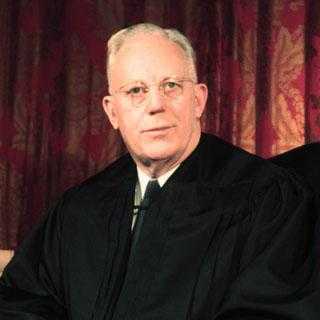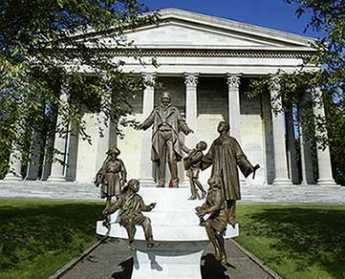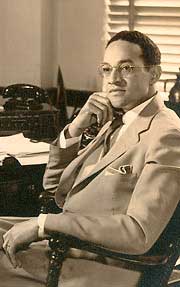Related Topics
Philadelphia Legal Scene
The American legal profession grew up in this town, creating institutions and traditions that set the style for everyone else. Boston, New York and Washington have lots of influential lawyers, but Philadelphia shapes the legal profession.
Academia in the Philadelphia Region
Higher education is a source of pride, progress, and aggravation.
Old Age, Re-designed
A grumpy analysis of future trends from a member of the Grumpy Generation.
Education in Philadelphia
Taxes are too high, but the tax base is too small, so public education is underfunded. Drug use and lack of classroom discipline are also problems. Business and employed persons have fled the city, must be induced to return. Deteriorating education, rising taxes and crime are the immediate problems, but the underlying issue is lack of vigor and engagement by the urban population itself.
The Supreme Court Revisits Girard's Will

|
| Chief Justice Warren |
In the 1954 case of Brown v. Board of Public Education, Chief Justice Warren wrote an opinion for the U.S. Supreme Court (347 U.S. 483), overturning the 1896 doctrine of "separate but equal" in public school systems which the Supreme Court had laid down in Plessy v. Ferguson, 163 U.S. 537. Warren famously declared that separate was inherently not equal. The Brown decision did not extend to all public accommodations, or even to all schools. It was limited to public schools. Furthermore, in explaining why it took half a century for the Court to discover this principle, Warren pointed out the schools in the South were largely private schools at the time of the Plessy opinion, since the movement toward free common schools, supported by general taxation, had not yet taken hold. The central point in all this was that Brown desegregated public schools and nothing else. Therefore, when the case of Stephen Girard's will ("poor, white, orphan boys") came back before the Court, the issue was whether Girard College was a public school because Girard's will designate the City and State to appoint the trustees.

|
| Girard College |
The first black plaintiffs to seek admission to Girard College, at least in response to the Brown v. Board decision, were represented by Raymond Pace Alexander, a black member of Philadelphia City Council. Alexander maintained that the College's racial discrimination, employing the supervision of City and State governments, was unconstitutional. Since Alexander was plainly interested in the education of black students generally, it was important to stress the public school issue. Otherwise, invalidating many wills, and the policies of many private schools, would have been harmful to black students. For example, the Annenberg Foundation has donated $52 million to the United Negro College Fund, the W.K. Kellogg Foundation: $58 million for higher education for Hispanic and Native Americans, the Lilly Endowment: $92 million for the Hispanic Scholarship Fund and United Negro College Fund. The largest such private racially segregated donation is from Bill and Melinda Gates: $1 billion annually for 20 years for full scholarships for black, Hispanic, Native American and Asian students, seeking degrees in engineering, mathematics, science, and education. In the course of protracted litigation, it became clear that the Supreme Court's Brown decision could not be completely reconciled with its 1844 decision (Vidal v Girard Executors, 43 U.S. 127, upsetting the arguments of Daniel Webster) reaffirming all the language of the Girard Will. Girard made Girard College an essentially private school financed by private money. But the choice of the City and State to appoint trustees did create a degree of public involvement. Faced with challenging litigation, the courts would have to invalidate some feature or other of the will to maintain strict conformity with Brown v. Board of Public Education. Which choice -- admit black boys and girls, or find a different way to appoint trustees? Since the trustees selected by other means would very likely be exactly the same people, the choice seemed an easy legal one. The political choice was more difficult.

|
| Raymond Pace Alexander |
At first, the Supreme Court seemed to be taking the approach of changing the method of selection of trustees. They deflected (remanded) the matter to the Pennsylvania Supreme Court, which in turn remanded it to the Orphans Court in parallel with a newly-legislated power of the Orphans Court to appoint substitute trustees. The Girard case was headed for the conclusion that Orphans Court should either appoint new trustees or define a way to appoint them. Without the political appointment of trustees, Girard College was a fully private institution, unconcerned with the constitutionality of the Plessy decision, or with the Brown repeal of it.
However, further litigation ensued, with a new focus for the U. S. Supreme Court to ponder. The contention was made that Girard had two purposes in mind when he wrote the will. He wished to help the poor, white, orphan boys. But he also stated that he truly had the welfare of Philadelphia at heart, wishing to foster the prosperity of the City and the health and comfort of its inhabitants. Were these two distinct goals, or was the education of certain orphans a mechanism to enhance the welfare of the City? Involving the leading men of the city in the governance of the College, and acquiring the power and influence of its leading politicians might strengthen Girard College in many important ways. Could it be that the words about the general welfare were more than merely lawyer's boiler-plate? While the general public at that time and subsequently may well have regarded these pleadings as pretty specious, the critical audience for this case was made up of lawyers and judges, politicians and officials. The sitting judge had once volunteered to defend officers of the Communist Party against the charge that they advocated the overthrow of the government by force, so he was not afraid to adopt unpopular opinions. There has been no claim he was himself a Communist. But the viewpoints of immensely rich merchants were likely of secondary importance to him, especially by comparison with City Councilmen.
Judge Joseph S. Lord, in what turned out to be the final judicial opinion, seemed to emphasize a slightly different slant. If Girard had to make the choice now facing the court, between poor, white, orphan boys, and retaining the City as his surrogate trustee, Girard would have made the choice to retain the politician trustees. If that seems unlikely to a great many people, let's help him out a little. Let's suppose Girard the financial wizard could have the benefit of reviewing the first century of actual experience with his will. Is it not defensible to contend that the remarkable investment administration of the Board of City Trusts -- arguably just as effective as his own would have been -- would hold great appeal for this star of American investing? Would it not have been persuasive to this notorious micro-manager, that the quality of schools eventually depends more on who runs them, than on who is in attendance?
In any event, by 1968 after a long and complicated legal battle, the first black students were admitted. The case had reached the US Supreme Court, which declared the provisions of Girard's will were superseded by the Brown decision, and therefore the Trustees were permanently enjoined from denying admission of poor black orphans on the sole ground that they were not white, provided they are otherwise qualified for admission". In a second decision, the Court later added a second prohibition against the trustees denying admission to females.
The U.S. Supreme Court carefully specified that the trustees were the objects of its ruling since they were appointees of the State and Municipal government. In part, this precision had the effect of preserving the 1844 decision of the Supreme Court, upholding the provisions of the Girard will against Daniel Webster's assault, on behalf of Girard's other relatives and potential heirs. By taking a strict focus on the governmental appointment of the trustees, the Supreme Court was able to skirt the awkwardness of continuing the unhampered existence of a considerable number of estates and foundations devoted exclusively to the benefit of minorities.
Originally published: Wednesday, June 21, 2006; most-recently modified: Friday, May 24, 2019
| Posted by: Anthony I. Stills | Apr 1, 2012 8:00 AM |
I recognize that your education (most-likely)lacks the rigor of the true history of all of America's people. My acnestors' contributions do not make the final print of most HS US History texts.I do apologize if the four centuries of privilege enjoyed by some(not all white Americans)leaves you unfulfilled. Still, I assure you that you do not want to trade historical places with some of us. My ancestors fought(without recognition or appreciation) in the Civil War and the other great wars of this nation, built the great city's of our United States, demonstrated leadership in many professional disciplines(including medicine). I challenge you to read my brief genealogy---stopping to compare it to your own (social-economically), then ask yourself(honestly)what I(or anyone like me)owes you. My mother was born on a plantation-converted for share-cropping, in 1941(not 1841). She was raised by a mother and father who worked the land on which they resided(since our family's enslavement). Rent, groceries, and medicines were all purchased from and controlled by the landlord---owner of the Oswald Plantation. Still, my Grandmother and grandfather saved enough money to buy land of their own and build a house. Taking in laundry, growing/selling produce, and operating a small cafe, they would send my mother North(for a better life?). When my mother arrived she studied,got her first (non-cotton-picking) job. Many American blacks continued to be exploited well into the 1940's). When my dad died, my mother raised four children(in the Raymond-Rosen Housing Projects)alone. She has lived long enough to send two of us to Ivy schools. Our family is forever grateful to Penn, Bryn Mawr, Harvard and MIT. We are especially grateful to Affirmative Action. But, don't be deceived. We have earned everything we currently enjoy in life. You insult the integrity of great institutions, when you reduce their decisions to disable disparities to a "double-standard." I suggest to you and others that, thanks to our nation's diversity our best institutions are even better! In America, some of us are born into privelege we do not even recognize. As for me and my family, we have made the most of it all.
Best-wishes!
Lady-Liberty
| Posted by: Lady Liberty | Feb 23, 2011 5:47 PM |
| Posted by: Fairness To All | Jan 26, 2011 6:21 AM |